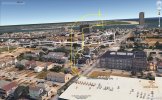There were posts on this a year ago, but here's more from Washington Post todsy.
In dozens of U.S. cities, the next time you call 911, a drone might show up before an officer does.
The technology behind that — “Drone as First Responder,” or DFR — has skyrocketed in popularity among police departments nationwide since the Federal Aviation Administration streamlined the process for agencies to adopt the program this spring. While it could previously take up to a year to get approval, it now often takes just days.
Law enforcement and drone industry leaders praise the technology as lifesaving, with the potential to help authorities in situations ranging from missing persons cases to active shooter incidents. But critics worry the programs encourage mass surveillance and violate the public’s privacy.
DFRs serve as an “eye in the sky,” police say, streaming footage to officers before they enter a potentially dangerous situation. One of the hardest aspects of policing is that in calls for service, “we don’t have crystal balls, we don’t know what we’re going into,” said Roxana Kennedy, chief of the police department in Chula Vista, California.
In dozens of U.S. cities, the next time you call 911, a drone might show up before an officer does.
The technology behind that — “Drone as First Responder,” or DFR — has skyrocketed in popularity among police departments nationwide since the Federal Aviation Administration streamlined the process for agencies to adopt the program this spring. While it could previously take up to a year to get approval, it now often takes just days.
Law enforcement and drone industry leaders praise the technology as lifesaving, with the potential to help authorities in situations ranging from missing persons cases to active shooter incidents. But critics worry the programs encourage mass surveillance and violate the public’s privacy.
DFRs serve as an “eye in the sky,” police say, streaming footage to officers before they enter a potentially dangerous situation. One of the hardest aspects of policing is that in calls for service, “we don’t have crystal balls, we don’t know what we’re going into,” said Roxana Kennedy, chief of the police department in Chula Vista, California.











